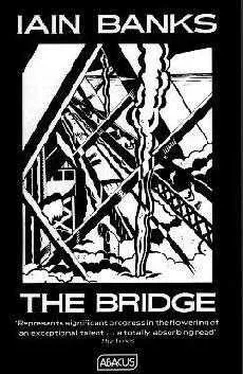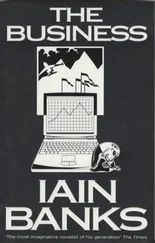The two men he liked in the company tried to persuade him to come in with them, partners in their own business; he wasn't sure. He talked to Mr Cramond about it, and Stewart. The advocate said it was a good idea in principle, but it would mean hard work; people expected things too easily these days. Stewart laughed and said 'Well, why not?' Might as well make money for himself as anybody else; pay your taxes under Labour and hire a very smart accountant indeed if the Tories got in. Stewart had his own, more severe problems though; he hadn't been really well for years, and he'd been finally diagnosed as diabetic. He drank bottles of Pils when they met, and looked longingly at other people's pints of Heavy.
He still wasn't sure about joining a partnership. He wrote to Andrea, who told him, 'Do it.' She would be coming back soon, she said, studies complete, Russian mistressed to her satisfaction, he thought: I'll believe she's back when I see her.
He had taken up golf - Stewart had persuaded him. He balanced this by joining Amnesty International after years of dithering, and sending a large cheque to the ANC after his firm had worked on a South African contract. He sold the Porsche and brough a new Saab Turbo. He was driving out to Gullane one bright Saturday in June to meet the advocate for a game at Muirfield, playing a tape which consisted solely of Because the Night and Shot by Both Sides recorded back-to-back time after time, when he saw the advocate's crumpled blue Bristol 409 being dragged up onto a breakdown truck. He drove on a little way, slowing but still heading for Gullane, telling himself the car with the stoved-in front and smashed windscreen wasn't Mr Cramond's, then turned round in a side road and went back to where two very young-looking policemen were measuring the road, the scarred verge and a shattered stone wall.
Mr Cramond had died at the wheel; a heart attack. He thought that wasn't such a terrible way to go, providing you didn't hit anybody else.
The one thing I mustn't say to Andrea, he thought, is, We can't go on meeting like this. He felt slightly guilty about buying a black suit for Mr Cramond's funeral when all he'd had for his own mother's was an armband.
He drove out to the crematorium with butterflies in his stomach; he was hung-over after finishing most of a bottle of whisky on his own the previous night. He felt he had a cold coming on. For some reason, as he drove into the place through a grey impressive gateway, he just knew that she wasn't going to be there. He felt physically sick, and ready to turn around and go; drive away anywhere. He tried to control his breathing and his heart and his sweating palms, and he drove the Saab on into the wide immaculate grounds, towards the cluster of parked cars in front of the low buildings of the crematorium.
He hadn't felt like this at his mother's funeral, and he hadn't really been all that close to the advocate. Maybe they would think he was still drunk; he'd had a shower and brushed his teeth but he probably smelled of whisky from his pores. Despite his new suit he felt grubby. He wondered if he should have brought a wreath; he hadn't thought.
He looked round the cars. Of course she wouldn't be there; it made a warped sort of sense; expected here she somehow wouldn't be able to show; given up for ever at his mother's grave, she had suddenly appeared. All part of life's rich pattern, he told himself, straightening his black tie before approaching the opened doors. Just remember son, he thought. This is bat country.
She was there, of course. She looked older but more beautiful; under her eyes there were little pucker-marks he'd never noticed before; tiny fleshy folds which made her look as though she'd been brought up for ever squinting into some desert storm. She took his hand, kissed him, held him for a second then let go; he wanted to say she looked beautiful, that she looked beautiful in black; but even while he was telling himself what a cretin he was, his mouth was mumbling something equally but more acceptably inane. He could see no tears in her perfectly made-up eyes.
The service was brief, surprisingly tasteful. The minister had been a personal friend of the advocate, and listening to his short but obviously sincere eulogy, he felt his eyes tingle. I must be getting old, he thought; either that or drinking too much of the hard stuff and getting soft. The man I was ten years ago would have sneered at me for being moved almost to tears by words spoken by a minister in praise of an upper-middle class barrister.
Nevertheless. He talked to Mrs Cramond after the service. If he hadn't known her better he'd have thought she was on drugs; she seemed to glow, her eyes wide, her skin shining with an energy born of death; a tearless astonishment, a state of shock produced by the taking away of the man who for more than half her life had been half her life; something beyond the immediacies of grief. He thought of the instant after some injury, when the eye saw the hammer crush the finger, or a slipping blade cut flesh, but before the blood flowed or the pain signal reached the brain. She was in that penumbra now, he thought, surfaced in the oily calm seas of the storm's eye. She was leaving the following day, for a holiday with a sister in Washington DC.
The last thing she said to him was, 'Will you look after Andrea? They were so close; she won't come with me. Will you look after her?' He said, 'If she'll be looked after ... There's somebody in Paris, anyway, she might-' 'No,' said Mrs Cramond, and shook her head once, quite definite (a gesture the daughter had inherited; he suddenly saw one in the other). 'No, it's you. You,' she said, and squeezed his hand before getting into her son's Bentley. She whispered, 'You'll be the closest now.'
He stood, puzzled, for a while, then went to look for her. She was outside, in the car park, slouched against an undertaker's black Daimler limousine. She was lighting up a menthol More as he walked up, frowning. 'You shouldn't do that,' he told her; 'think of your lungs.' She regarded him with crushed-looking eyes. 'Solidarity,' she said bitterly. 'My old man's smoking at the moment too.' A small muscle in her jaw trembled. 'Oh, Andrea,' he said, suddenly filled with pity for her. He put his hand out towards her but she flinched away, turning from him and pulling her black coat tighter about her. He stood still for a moment, knowing that a few years ago he would have been hurt at this instant of rejection, and probably turned on his heel. He waited, and she came back to him, throwing the More down into the gravel and stepping on it with one black, swivelling shoe. 'Get me out of here, kid,' she said. 'Beam me up Scotty. Where's the Porsche? I was looking for it.'
They took the Saab to Gullane; she wanted to see the place where he'd died, so they stopped at the still ripped-up trench of verge and the not-yet repaired wall. He watched her in the rear-view mirror, standing looking down at the torn piece of turf as though expecting to see the grass grow back before her eyes. She touched the gashed ground and the stones of the farm wall, then came back to the car, rubbing stone-dust and earth from her pale, manicured fingers. She told him that her brother thought she was morbid for wanting to come here. 'You don't think I am, do you?' He said no, no, she wasn't. They drove on to the cold, empty house on the dunes overlooking the firth.
She turned and hugged him as soon as they were through the door; when he tried to kiss her, gently and softly, she rammed her mouth against his, her nails dug into his scalp, into his back through his jacket, into his buttocks through the black suit's trousers; she made a whimpering noise he'd never heard her make before and pushed his jacket offhis shoulders. He had just decided to go along with this desperate, anguished, erotic reaction, but to try to manoeuvre her into somewhere a little more comfortable than the draughty front hall with its cold tiles and bristly doormat, when such a decision became unnecessary. It was as if his body woke up to what was actually happening, as though some instantly transmissible fever spread from her to him. He was suddenly as consumed, as wildly, absurdly abandoned as she was, wanting her more than he could ever remember having wanted her before. They collapsed onto the doormat, she pulled him to her, without taking off coat or underclothes. It was over for them both in seconds, and only then did she cry.
Читать дальше












